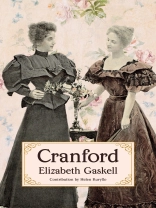In the small village of Cranford, some twenty miles from the bustling industrial city of Drumble, the lives of the town’s eccentric, endearing characters are revealed in a tapestry of intimate vignettes that reveal the social intricacies of nineteenth-century English society. With humor, heart, and wit, Elizabeth Gaskell imagines a world populated by a loyal circle of female friends whose idiosyncrasies and camaraderie form the fabric of this captivating narrative. As the industrial revolution impacts the town and societal norms evolve, Cranford faces both external and internal changes. The gentle Miss Matty Jenkyns and her fellow Cranfordians navigate the challenges of their shifting landscape with grace and tenacity, providing a heartwarming and insightful glimpse into the lives of ordinary people in an extraordinary setting. The saga of their tribulations and joys is a must-read for all fans of the work of Jane Austen and the Brontë sisters. Cranford is not just the story of a place; it’s a celebration of community and the enduring power of human connections.
This Warbler Classics edition includes an essay about the subtly subversive nature of Cranford-a pioneering novel in its time-and a detailed biographical timeline.
Table of Content
Contents
Chapter I. Our Society
Chapter II. The Captain
Chapter III. A Love Affair of Long Ago
Chapter IV. A Visit to an Old Bachelor
Chapter V. Old Letters
Chapter VI. Poor Peter
Chapter VII. Visiting
Chapter VIII. ‘Your Ladyship’
Chapter IX. Signor Brunoni
Chapter X. The Panic
Chapter XI. Samuel Brown
Chapter XII. Engaged to Be Married
Chapter XIII. Stopped Payment
Chapter XIV. Friends in Need
Chapter XV. A Happy Return
Chapter XVI. Peace to Cranford
A Woman’s Text in the Wild Zone: The Subversiveness of Elizabeth Gaskell’s Cranford by Helen Kuryllo
Biographical Timeline
About the author
Elizabeth Gaskell (1810-1865) was an English writer of novels, short stories, and poetry. Gaskell’s social conscience and firsthand experiences of the working-class struggles deeply influenced her writing. Her debut novel, Mary Barton (1848), brought her literary acclaim. Gaskell’s subsequent novels, including Cranford (1853) and North and South (1855) further solidified her reputation as a masterful chronicler of social issues and human relationships.












